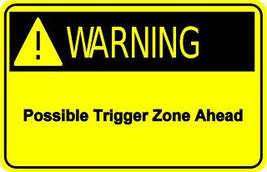
Triggers can often be at an unconscious level and you may not even be aware that you have been triggered.
Triggers can make you feel like you are back in your past reliving or re-experiencing a traumatic event(s) called flashbacks. Triggers can also leave some individuals feeling like they are are "little" again.
You may notice that triggers can increase your fear response, reinforce not feeling safe in the world, lead to confusion or misinterpretation of what is actually happening in the present, and can also contribute to AVOIDANCE BEHAVIOUR.
- anger or rage
- isolating or overworking
- self-loathing - criticism
- increased flashbacks
- self-harm - cutting, burning
- depression
- suicidal thoughts or homicidal thoughts
- increased physical pain - headaches, backaches
- activation of chronic medical problems - such as increased blood sugar if you are a diabetic, increased blood pressure if you suffer from hypertension, recurrence of urinary tract infections if you are prone.
Avoidance
Avoidance is often used as a protective mechanism and is generally based on fear, shame, and/or being overwhelmed by past traumatic experiences.
Avoidance can be an escape from your "outer world" for example, avoiding public places or social gatherings due to generalized fears. This avoidance can lead to isolation and withdrawal from important relationships/supports in your community.
Avoidance can also be an escape from your "inner experiences" such as painful emotions, thoughts and or memories.
Is avoidance always a problematic response in trauma?
NO: Sometimes you may want or need to avoid certain situations/people that are threatening or abusive in the present. Also, some circumstances or intense feelings may be too triggering or overwhelming and you may not have sufficient coping skills yet to deal with that situation or event in a healthy way.
However, avoidance is problematic when it leads to frequent numbing, shutting down or dissociating and/or leads to isolating and withdrawing from supports/relationships in the community.
Avoidance can also be problematic when it contributes to you not being able to adequately experience feelings or body responses associated with understanding yourself and your responses to the world. Self-care, safety and important relationships may be compromised.
Avoidance is based on fear/shame around past trauma can contribute to rob you of self-worth, self-understanding and can often lead to a life based on distortion and misconceptions versus the truth.
How can you manage the impact of triggers?
First, try not to be hard on yourself if you are experiencing difficulty managing the triggers and associated responses to the triggers. It is important that you have compassion for yourself as well as maintain realistic expectations. Learning new strategies will take time, patience and practice.
Step #1: Education and Awareness (Mindfulness)
The more you can be aware of your triggers the more you will be able to respond more effectively over time. Remember, many triggers are unconscious and over the years your response has become an automatic reaction. A traumatized brain when triggered, does not perceive trauma threat as over so you respond as if the threat was happening in the present.
A trigger chart can help you increase your awareness around:
A. What are your triggers?
B. What is your response or reaction to that trigger.
C. How is that trigger associated to a past traumatic event.
D. How you can prepare for a trigger that you are unable to avoid (such as social encounter).
Don't worry if you are unable to initially connect the trigger to a past event - this is common and will come with time. You can still use healthy coping strategies to repetitively teach your mind and body that you are actually in the present versus the past even if you are unable to connect with a particular past event.
Step#2: Identification/understanding of unhealthy responses to triggers (such as shutting down, numbing out, dissociating, becoming overwhelmed with intense emotions, negative thoughts, urges or impulsive self-destructive behaviours) the implementation of early interventions/coping strategies will be more effective.
Step#3: Learning new coping skills.
Along with education and increased awareness (mindfulness), there are also a number of interventions (stabilization skills) that will help you with distressing symptoms that impact daily functioning.
The above information comes the PTSD support group I attended through the London Health Sciences Centre (LHSC) and it has been re-typed exactly as given to me. Please do not use this information to self-diagnose PTSD. This information is being shared for informational purpose only and for your personal "entertainment". I am NOT a doctor and am not qualified to diagnose PTSD. If you have questions about what you read here please speak to your family doctor and/or treatment team.
 RSS Feed
RSS Feed
